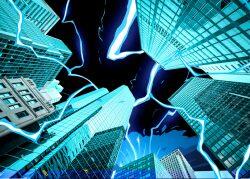State legislators and environmentalists want to rock New York down to electric avenue.
Democrats and climate advocates are pushing to pass two statewide building electrification bills next year, the Times Union reported.
The first calls for the electrification of all new buildings constructed in the state, beginning as early as 2024. Existing buildings could continue to use fossil fuel for heat and hot water. New York City already has such a law; it kicks in in two to five years, depending on the size of the project.
The other state bill would repeal the “100-foot rule,” which utility companies use to subsidize new gas hookups for residential customers within 100 feet of a gas line. Backers say it would prepare utilities to eventually taper off natural gas use.
Read more



Environmentalists are targeting buildings because they account for one-third of greenhouse gas emissions in the state, more than any other source. The state has set a goal to have a zero-emissions electric grid by 2040.
But the oil and gas industries hope to scuttle the legislation, as they did to similar bills last session. Industry-backed group New Yorkers for Affordable Energy opposes the proposals, warning about the reliability and cost of a power grid that depends on renewable energy.

New Yorkers for Affordable Energy’s Michelle Hook
“There seems to be an undertone of a desire to just completely flip a switch and eradicate natural gas immediately,” Michelle Hook, executive director of the coalition, told the Times Union. “It’s just not possible.”
Rich Schrader, an environmental strategist for the Natural Resources Defense Council, agreed that a change can’t be made overnight, but noted the need for tough policies to stave off climate change’s worst impacts.
Three years ago, the state approved the Climate Leadership and Community Protection Act, a plan to reduce New York’s greenhouse gas emissions 40 percent by 2030 and 85 percent by 2050, compared with 1990 levels.
New York City provided the spark for electrifying buildings. Last year, the City Council approved a measure requiring electric heat and hot water in buildings shorter than seven stories constructed beginning in January 2024 and taller ones in July 2027.
The state legislation would largely mirror the city’s.
Much of the state’s electricity is generated by burning fossil fuel, but the percentage that comes from wind, solar and hydropower is projected to increase. Power from nuclear energy, which is also zero-emission, decreased with the closure of the Indian Point Energy Center brokered by then-Gov. Andrew Cuomo.
— Holden Walter-Warner
